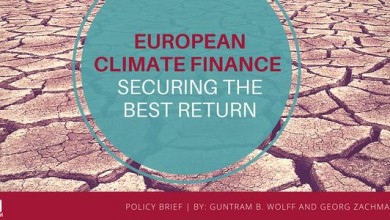Seminar for Master of Public Policy at University of Erfurt’s Willy Brandt School of Public Policy
Seminar: The Economics of Climate Change
Instructor: Prof. Dr. Guntram Wolff
For students in the Master of Public Policy program at the University of Erfurt
Language: the course will be taught in English
Short description: Scientific evidence is clear: human activities have released enough greenhouse gases (GHG) in the atmosphere to have altered the climate, with already strong effects on ecosystems, societies, and economies. On current emissions paths, climate change is set to become dramatically worse. To limit global warming, and hence avoid the worst-case scenarios predicted by climate science, the world economy must rapidly reduce its GHG emissions and reach climate neutrality within the next three decades.
In this seminar, we want to learn about the complex interplay between climate change and economic activity. We will start off by asking the question, whether economic growth is compatible with declining emissions or whether, instead, societies need to accept de-growth and lower living standards to ensure rapid de-carbonization. Achieving decarbonization requires global actions: we will study the global public good and tragedy of the commons problems and solutions that have been proposed – this will help us understand why progress in the UN-based COP summits is insufficient, and why global emissions continue to rise. We will then study the domestic distributional effects of climate policy. Public finance and decarbonization also interact in complex ways and will be studied. Furthermore, the role of industrial policy and innovation for decarbonization will be explored. We also want to look at the role the financial system and central banks play in climate policy.
Organization of seminar
This is an interactive seminar for all students interested in one of the most pressing global public policy problems. Besides the introduction, we will have 12 sessions in which we want to jointly explore these topics. The professor will introduce each session for about 30 minutes. To have an effective discussion, students will be organized in small groups witch each group being responsible to prepare one topic and present in the respective session. The presentation should be around 20 – 30 minutes and needs to contain more than a literature review. All students are expected to participate in the 30 minutes discussion. We will also invite guest speakers from policy making institutions. Beyond the presentation (3 credits and a “pass”), students taking the module exam in this course are expected to write a short policy note. Grading will be based on the presentation (30%) and paper (70%).
- Introduction on content; discussion, assignment of presentations to students
- An overview of the economics of decarbonization: growth vs degrowth
- Global climate governance: COPs & Clubs
- Global energy transition: electrification, hydrogen, energy efficiency, behavioral change, and more
- The geopolitics of the green deal
- Introduction to EU climate policy (with EU official speaking)
- Climate policy and public finance implications
- Distributional effects of climate policy
- Green innovation and green industrial policy
- Mobilizing the financial system for decarbonization (with ECB speaker)
- Central banks and the green transition
- Green transition in developing countries
- International climate finance: Mobilizing private finance, dealing with external debt and exchange rate risks


